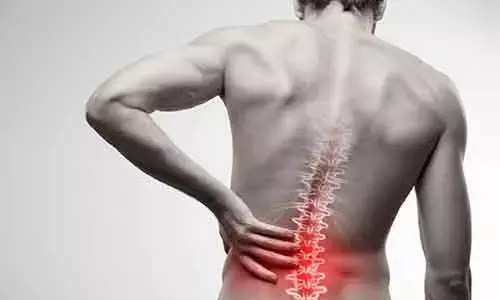- Home
- Medical news & Guidelines
- Anesthesiology
- Cardiology and CTVS
- Critical Care
- Dentistry
- Dermatology
- Diabetes and Endocrinology
- ENT
- Gastroenterology
- Medicine
- Nephrology
- Neurology
- Obstretics-Gynaecology
- Oncology
- Ophthalmology
- Orthopaedics
- Pediatrics-Neonatology
- Psychiatry
- Pulmonology
- Radiology
- Surgery
- Urology
- Laboratory Medicine
- Diet
- Nursing
- Paramedical
- Physiotherapy
- Health news
- Fact Check
- Bone Health Fact Check
- Brain Health Fact Check
- Cancer Related Fact Check
- Child Care Fact Check
- Dental and oral health fact check
- Diabetes and metabolic health fact check
- Diet and Nutrition Fact Check
- Eye and ENT Care Fact Check
- Fitness fact check
- Gut health fact check
- Heart health fact check
- Kidney health fact check
- Medical education fact check
- Men's health fact check
- Respiratory fact check
- Skin and hair care fact check
- Vaccine and Immunization fact check
- Women's health fact check
- AYUSH
- State News
- Andaman and Nicobar Islands
- Andhra Pradesh
- Arunachal Pradesh
- Assam
- Bihar
- Chandigarh
- Chattisgarh
- Dadra and Nagar Haveli
- Daman and Diu
- Delhi
- Goa
- Gujarat
- Haryana
- Himachal Pradesh
- Jammu & Kashmir
- Jharkhand
- Karnataka
- Kerala
- Ladakh
- Lakshadweep
- Madhya Pradesh
- Maharashtra
- Manipur
- Meghalaya
- Mizoram
- Nagaland
- Odisha
- Puducherry
- Punjab
- Rajasthan
- Sikkim
- Tamil Nadu
- Telangana
- Tripura
- Uttar Pradesh
- Uttrakhand
- West Bengal
- Medical Education
- Industry
Tanezumab reduces chronic low back pain in large international study

A new study has found that tanezumab, a monoclonal antibody that inhibits nerve activity, provides relief in patients with chronic low back pain, one of the leading reasons why people seek medical care and the number one cause of disability worldwide.
This study demonstrates the potential of tanezumab to treat individuals suffering from moderate-to-severe chronic low back pain who have been unable to achieve relief with currently available medicines.
Tanezumab, an investigational non-opioid pain medication, is part of a class of nerve growth factor inhibitors. It is a monoclonal antibody that targets and binds to NGF, which increase in the body following injury, inflammation, or during chronic pain. Tanezumab has not shown a risk of addiction, misuse, or dependence in studies that have been conducted.
"This demonstration of efficacy is a major breakthrough in the global search to develop non-opioid treatments for chronic pain," said John Markman, M.D., director of the Translational Pain Research Program in the University of Rochester Medical Center (URMC) Department of Neurosurgery and lead author of the study which appears in the journal Pain. "There were also improvements in function linked to the reduction in pain severity."
This is the first study that shows long-term relief for chronic low back pain with a single dose of tanezumab delivered under the skin once every two months. The study was conducted in 191 sites across eight countries in North America, Europe, and Asia.
Researchers are increasingly finding that certain proteins circulating in the bloodstream heighten the sensitivity of cells in the nervous system to pain. One of these proteins, called nerve growth factor (NGF), may explain why some individuals experience more intense and chronic back pain. Tanezumab is an NGF inhibitor.
The patients with chronic low back pain enrolled in this study did not previously have relief with at least three different types of pain medication, including opioids, and were considered "difficult-to-treat." Patients with symptoms, signs, and x-ray evidence of moderate-to-severe osteoarthritis, a disorder commonly found in older patients with chronic low back pain, were excluded from the study.
Tanezumab has not been associated with the often serious adverse side effects seen with opioids or nonsteroidal anti-inflammatory drugs (NSAIDs), which are often used to treat low back pain. However, this class of drugs has been linked to joint problems, which are sometimes serious enough to require joint replacement. Because of this concern, the researchers followed participants for an extended period and determined there was a low rate of serious joint problems requiring joint replacement.
"In the future, clinicians may have to weigh the different risks of lumbar fusion surgery, chronic opioid use, or NSAIDs against the unique risks of a rare but rapidly progressive form of joint problem associated with blocking nerve growth factor," said Markman. "I expect that that the tradeoffs between benefit and risk will be different for osteoarthritis than for chronic low back pain."
Hina Zahid Joined Medical Dialogue in 2017 with a passion to work as a Reporter. She coordinates with various national and international journals and association and covers all the stories related to Medical guidelines, Medical Journals, rare medical surgeries as well as all the updates in the medical field. Email: editorial@medicaldialogues.in. Contact no. 011-43720751
Dr Kamal Kant Kohli-MBBS, DTCD- a chest specialist with more than 30 years of practice and a flair for writing clinical articles, Dr Kamal Kant Kohli joined Medical Dialogues as a Chief Editor of Medical News. Besides writing articles, as an editor, he proofreads and verifies all the medical content published on Medical Dialogues including those coming from journals, studies,medical conferences,guidelines etc. Email: drkohli@medicaldialogues.in. Contact no. 011-43720751


